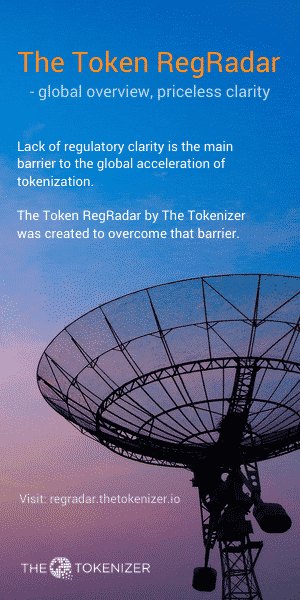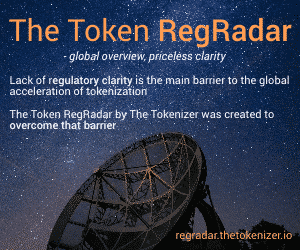A sneak peek at our upcoming regulatory reports vol. 3
Regulatory overview across jurisdictions is crucial for accelerating our new tokenisation industry. That’s why The Tokenizer has launched The Token RegRadar and The RegCheck Service Suite, and it’s also why we are now preparing to publish the two new reports, Regulation at a Glance – Europe and Regulation at a Glance – Asia.
These two comprehensive reports provide an overview of the regulatory status of security tokens in no less than 26 European countries and 29 Asian countries. Below is a sneak peek into the Regulation at a Glance – Asia report, with a chapter on Bahrain.
Bahrain
In Bahrain, the regulation of digital assets – including security tokens and STOs – falls under the jurisdiction of the Central Bank of Bahrain (“CBB”). Initially, the CBB issued a comprehensive set of regulations in 2019, known as the Crypto Assets Regulatory Rules (“CRA Rules”), to govern activities involving crypto-assets. This is where the term “crypto-asset” was initially defined as virtual or digital assets or tokens operating on a blockchain platform and protected by cryptography.
The 2019 CRA Rules addressed various dimensions of digital asset services, encompassing areas such as dealing, brokering, advisory roles, custody, and exchange operations. The regulations also spelled out a framework for technology standards, risk management, minimal capital requirements, and licensing prerequisites – all aimed at investor protection. According to these rules, anyone wishing to engage in regulated crypto-asset activities in Bahrain must obtain a corresponding license from the CBB.
Fast forward to March 2023, and the CBB has issued amendments to the CRA Rules, thereby expanding the scope to include “Digital Token Offerings.” This update also introduces more nuanced categories of crypto-assets: Payment Tokens, Utility Tokens, Asset Tokens, and Hybrid Tokens, each serving different purposes and functionalities as described below:
- Payment Tokens: which are virtual tokens which can be digitally traded and used for acquiring goods or services or for investment purposes. They give rise to no claims on their issuer and are usually decentralized.
- Utility Tokens: which are tokens intended to provide access to a specific application or service.
- Asset Tokens: which represent assets such as a debt or equity claim on the issuer. These tokens can promise a share in future company earnings or future capital flows and are essentially analogous to equities, bonds, or derivatives. Notably, tokens enabling physical assets to be traded on the blockchain fall into this classification.
- Hybrid Tokens: which are tokens that have features of one or more of the other types of tokens.
In addition to these specific crypto-asset types, the amendments have ushered in a more structured licensing system for crypto-asset service providers, delineated into four categories based on the services offered:
- Category 1 Licensees can receive and transmit orders and offer investment advice related to crypto-assets, with a minimum capital requirement of BD 25,000.
- Category 2 Licensees are permitted to trade in crypto-assets as agents, manage portfolios, offer crypto-asset custody, and provide investment advice. The capital requirement for this category is BD 100,000.
- Category 3 Licensees, in addition to the services allowed under a Category 2 license, can trade in crypto-assets as principals and serve as digital token advisors. They must meet a minimum capital requirement of BD 200,000.
- Category 4 Licensees are enabled to operate a licensed crypto-asset exchange, provide crypto-asset custody, and act as digital token advisors, with a capital requirement of BD 300,000.
All license applications must include a business plan, application forms for all shareholders and subsidiaries, and forms for all controlled functions. The CBB may also require additional capital to be held to ensure the financial stability of the licensee. Applicants must also pay an application fee of BD 100 and are subject to a variable annual license fee based on 0.25% of their relevant operating expenses (subject to certain minimum and maximums).
Bahrain’s updated definition of “securities” now also embraces certain types of crypto-assets, characterized by tokens that offer financial entitlements, grant decision-making power in a project, or represent a monetary claim on the issuer. Consistent with a technology-neutral stance, the CBB evaluates whether a particular token qualifies as a security by analyzing its underlying economic purpose, structural attributes, and attached rights.
As mentioned above, if a token is deemed an Asset Token, it will be regulated by the CBB, who serves as the regulatory authority overseeing Bahrain’s capital markets, which includes the Bahrain Stock Exchange (“BSE”). Established under the Financial Institutions Law 2006 (“2006 Law”), the CBB is governed by a comprehensive set of legal frameworks designed to collectively govern various aspects such as trading procedures, money laundering regulations, market rules, and listing rules.
In Bahrain, a “Digital Token Offering” refers to the process of raising funds through the offering of digital tokens, which are considered securities. For entities seeking to launch a Digital Token Offering, Bahrain’s regulatory framework mandates several compliance steps. First and foremost, a draft of the summary prospectus must be published in two daily newspapers – one in Arabic and the other in English – at least five days before the start of the offering period. The prospectus is an essential document that outlines detailed information necessary for potential investors.
As defined in Volume 6 of the CBB Rulebook, the prospectus must include, among other information:
- the issuer’s full name and registration number;
- the type and amount of securities being offered;
- the offer price and face or par value of the securities;
- eligibility criteria for subscribers;
- dates pertaining to the offering document and expiry of the prospectus; and
- a standard disclaimer statement, clearly outlining that the CBB and the licensed exchange assume no responsibility for the document’s accuracy.
For private placements, Section OFS-2.4 states that offers must be made only to accredited investors with a minimum investment threshold of USD 100,000 and limited to not more than 100 accredited investors. Issuers must ensure that the securities are not bought for reselling or redistribution as that would constitute a public offer. Several documents are required to be submitted by issuers, including:
- confirmation from the issuer ensuring that the offer aligns with Section OFS-2.4;
- a subscription form that includes the accredited investor status confirmation;
- a list of expected accredited investors, if available at the time of submission; and
- clear disclosures about any fees, such as offering expenses, upfront discounts, placement commissions, or other related costs in the Private Placement Memorandum.
Further, securities sold in private placements must not be transferred or redistributed to other investors within a one-year period following their acquisition.
Ultimately, the regulatory framework for Digital Token Offerings and digital assets in Bahrain has evolved to become a comprehensive and robust system, governed primarily by the CBB. With its recent amendments to the CRA Rules, the CBB has further refined the categorizations of crypto-assets and expanded its governance to include Digital Token Offerings, effectively encapsulating the dynamism of modern financial technology within a formalized legal structure.
For entities eyeing the Bahraini market, the message is clear: compliance is non-negotiable, but within those boundaries lies significant room for innovation and growth. Due diligence, rigorous documentation, and a thorough understanding of the CBB’s regulatory stances are not just advisable, but essential for any success in the market. As the sector continues to evolve, Bahrain stands out as a jurisdiction that combines opportunity with oversight, providing a blueprint for what a mature, well-regulated token economy can look like.
We are approaching lawyers and industry players in all relevant countries, offering them to participate as sponsors in the report. If you are interested, please contact our CEO, Michael Juul Rugaard, at [email protected] or by phone at +45 93 99 38 83.
Read other stories: CITD and Echo International Holdings Group embark on a HKD180million Tokenization Project















